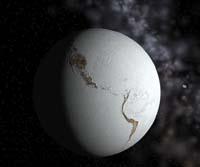Animal evolution recovered by global glaciation

Molecular oxygen gave a great boost to animal evolution, photosynthetic plants and algae caused an increase in the atmosphere and in the sea and began to develop animals with traditional respiratory systems today. A leap in the evolution of animals. And it was not the only fact. Scientists from the oceanographic organization Woods Hole of Massachusetts have stated in the journal Nature that the oxygen level multiplied by two in times after the two global glaciations.
During the global glaciations, the entire planet - or almost entire - was covered by glaciers and, according to scientists, the erosion of glaciers caused the start of a chain of phenomena. Erosion reduced many stones and as the glaciers receded, a lot of phosphorus was released. This phosphorus reached the sea and was fertilizer for algae. Increase of algae and, in general, of organic matter. The activity of algae and the sedimentation of organic matter caused a sharp increase in the amount of oxygen after the global glaciation. This also stimulated the evolution of animals.
To analyze this hypothesis, scientists have analysed the evolution of the phosphorus level of the sea, which has remained unchanged except in times after global glaciations. There are still many data to be analyzed to make the hypothesis good, but many experts believe that the Massachusetts team is on the right track.





